The Medici Classical English framework covers full-length classical novels and source documents for informational text. These are the framework for ELA standards and Values and Virtues education.
Character education is the development of knowledge, skills, and abilities that help scholars make informed and responsible choices. Character is derived from a Greek word that means “to mark," as on an engraving. Character education enables students to come face-to-face with the realities of life and have the skill sets to deal with what is presented. Schools see every type of positive and negative home experience walk through the doors and have a role in preparing scholars for the challenges and joys of their lives ahead. The role of schools in partnering and aligning with the families in their care is important not just for academic outcomes but for preparing students for life beyond school. Values and virtues serve as the basis for your scholar's moral codes and ethical reflection. Over time, your child will develop their own value system based on many influences, including family, religion, school, peers, culture, race, social background, gender, etc. Values guide individuals, families, communities, and institutions, and without values, societies crumble. We take this part of our education very seriously because sadly, in some cases, our schools may be the only places a scholar is exposed to the deeper aspects of being virtuous.
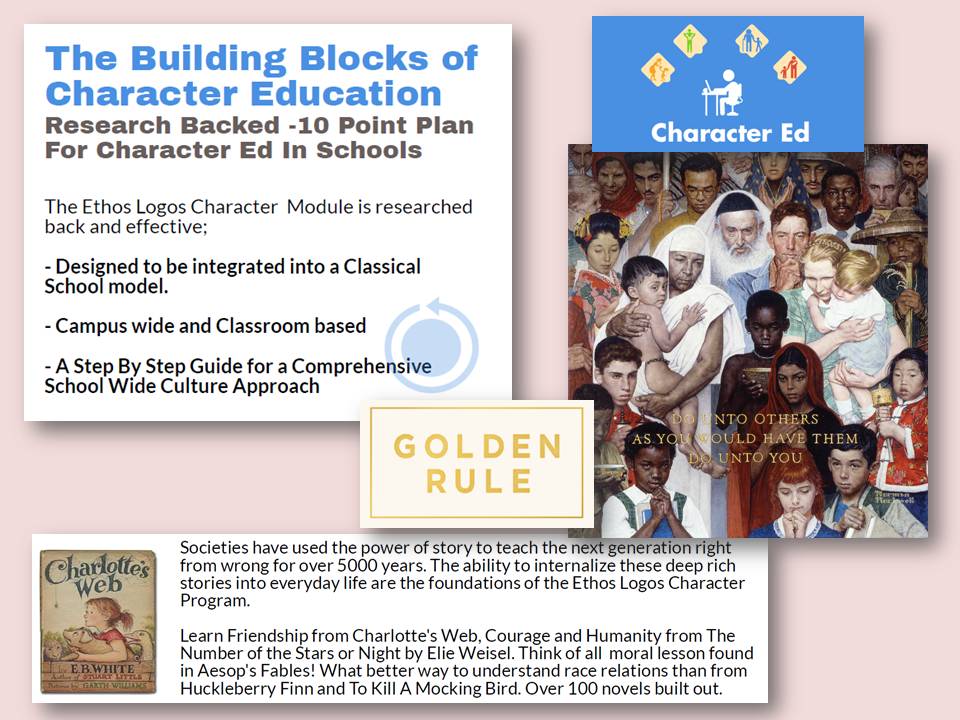
Beyond reading and math, a complete education must include modeling character traits that will prepare our kids for their time beyond school. Plato and Aristotle called character formation Arte (pursuit of excellence) and explained the Golden Mean as an ideal way to live. 2500 years later, those foundations of a well-rounded education never went away.
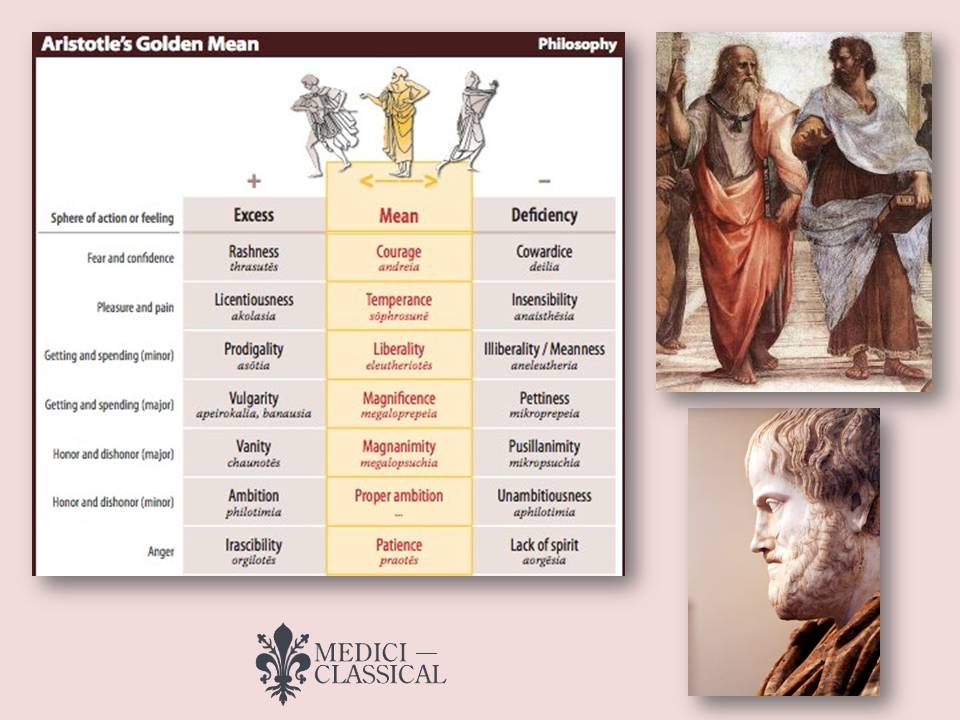
For the past couple hundred years, Catholic, Jewish and Christian schools have integrated character development concepts into their school culture. We have defined, embedded, trained, and monitored the effectiveness of a defined set of character traits in every grade and in school-wide initiatives. Over years of trial and error and real-world implementation, a 10 Point Plan has emerged, including curriculum support and training, ensuring character formation isn't an afterthought but one of the main goals of our schools.
We have compiled our Value and Virtue curriculum into an easy-to-use and understand kit. This kit helps you with the tools and ideas to integrate values and virtues instruction into every lesson. We start with 18 selected values that are programmed across a 10-month school year. Two months of the year cover one larger virtue concept so we only provide one character trait for Grit/Perseverance or Tenacity and the Classical Education concept of Truth, Beauty, and Goodness.
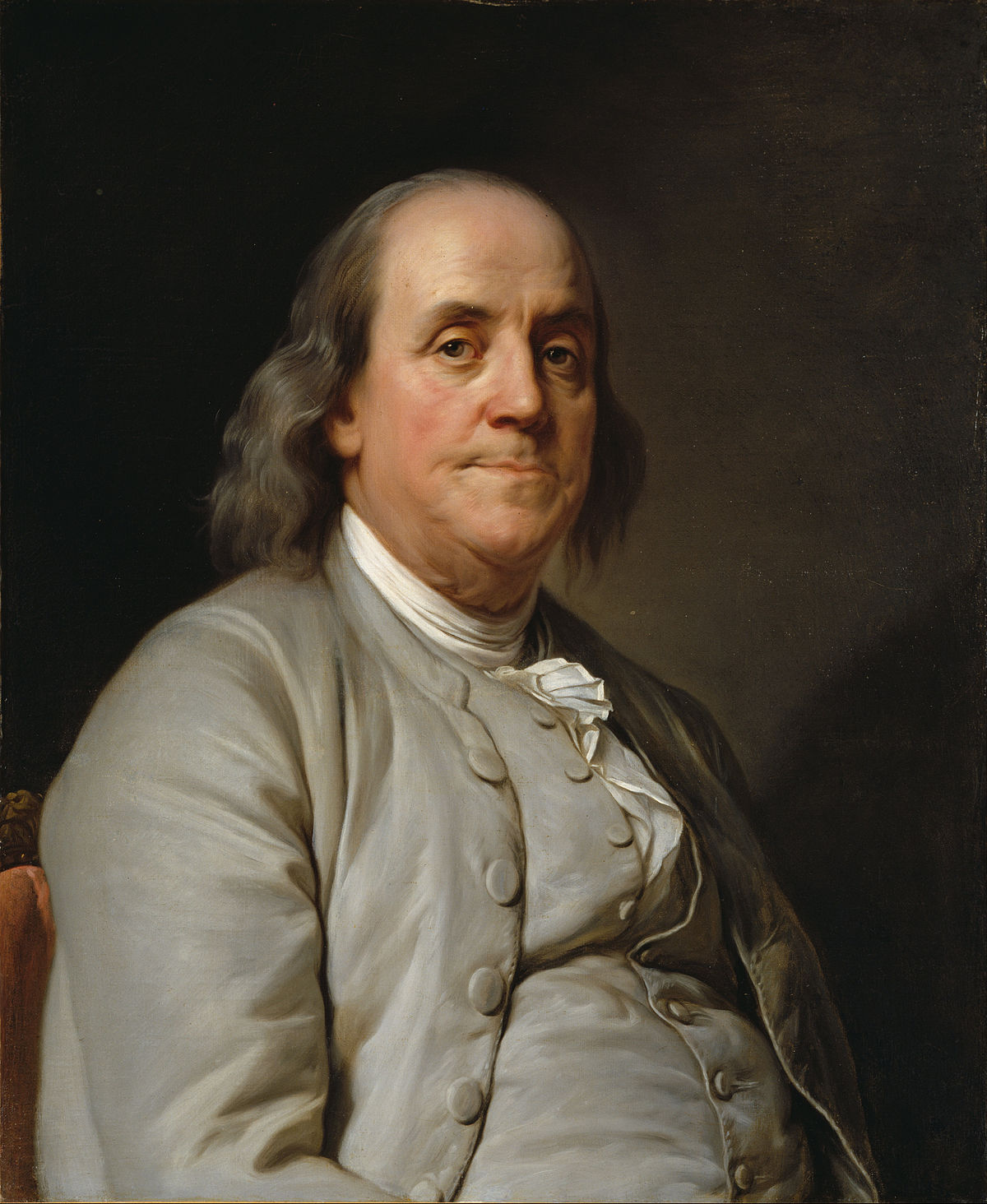
We built our value and virtue curriculum using Ben Franklin's famous 13 Virtues as a foundation. Almost 250 years after Franklin published his virtues for a good life, many of these concepts still apply today. Next, we added in specific character traits that are unique or important to the Classical education experience. Each month we have embedded one or two Values and Virtue lessons into all of our subjects at each grade. You will notice on the back/bottom of our English, Science, and History lesson cards you will find the feature value/virtue that aligns with that particular month. We encourage our teaching staff and Principals to find unique and creative ways to make the monthly values come alive. In English, it may involve an essay assignment or Socratic discussion on how a particular character exhibited a particular featured value or it may include a campus-wide project designed around the virtue of the month. We programmed these into our schools to ensure that teachers are focused and intentional about character education. You, as the homeschool parent are encouraged to do the same. Never miss an opportunity to talk about right or wrong.
Many times, we will call out questions or prompts in history or in our novel studies that incorporate a particular value or virtues. We also detail bullet-pointed ideas, top 10 lists, quotes, or discussion starters on each of our 18 Values and Virtues Lesson Cards. These are designed to be at your scholar work desk or at the dinner table to help spur deeper family discussion.
We also include a workbook to accompany our Values and Virtues Lesson Cards. The accompanying workbook digs further into the research and question prompts, which you can easily overlay into your scholar's English, history, arts, or science instruction. The One Million and One Question Project for character instruction are loaded with discussion starters, writing prompts, and ideas that may help you in tailoring your scholar's lessons.
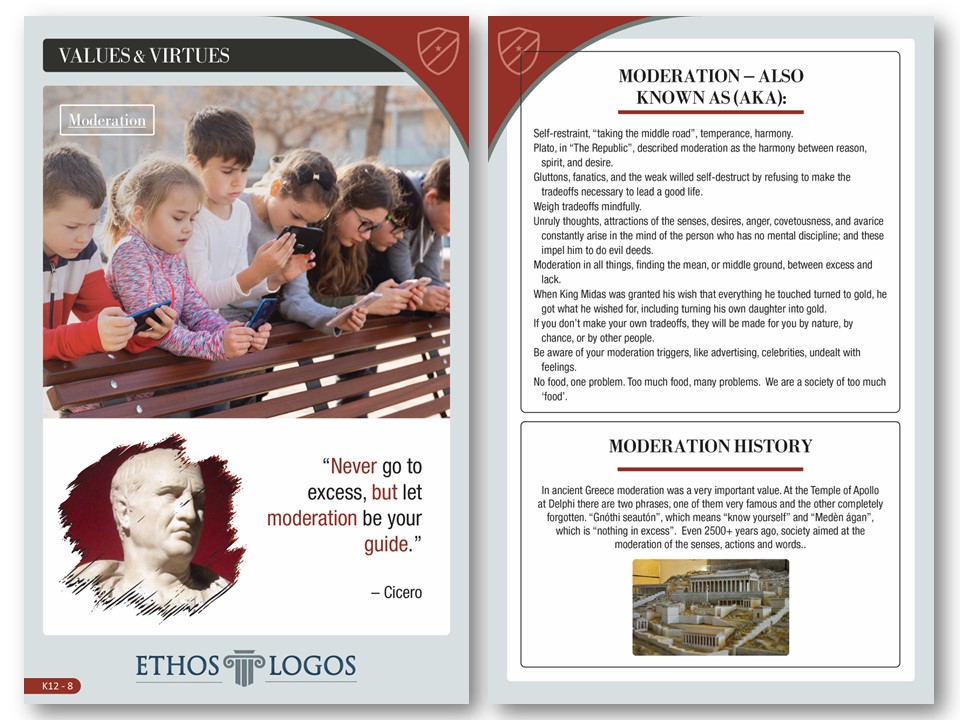
The Medici/Ethos Logos Character lessons provide instructional materials, methods, and strategies, that have been crafted into interdisciplinary curricular themes. These themes empower teachers/parents to create meaning while allowing students time to explore and learn about themselves.
Simply put, the goal of a character education program is practicing the Golden Rule and treating others the way you want to be treated.
The Medici Classical character integration is designed to help you as a parent take full advantage of the Classical Education school model. We've designed our character education offerings to be a standalone character program with some intentional linking to the various lessons and units you will be covering. What that looks like in our lesson plans includes embedding a character focus with:
James Joseph Heckman, a Nobel Prize-winning American economist, has done extensive research on character, how it’s shaped, and a school's role in character development. Heckman surmised:

Character is a skill—not a trait. It can be enhanced, and there are proven and effective ways to do so. Character is shaped by families and social environments. At any age, character skills are stable across different tasks, but performance on any task depends on multiple skills as well as the effort expended on it. Effort, in turn, depends on the incentives offered to perform the task. Since all measures of character and cognition are measures of performance on some task, it is necessary to standardize for incentives, effort, and other skills in measuring any particular character or cognitive skill. Despite these difficulties, reliable measures of character have been developed, although there is always room for improvement. Though stable at any age, skills are not set in stone over the life cycle. Both cognitive and character skills can change. Parents, schools, and social environments shape them, although there are important genetic influences. Skill development is a dynamic process. The early years are important in laying the foundation for successful investment in the later years. While there is hard evidence on the importance of the early years in shaping all skills, some character skills are more malleable than cognitive skills at later ages.
Our team embarked on reviewing 25-plus years of Character Education research and developed a 10-point plan to successfully implement and monitor a character ed program in our schools. All 50 states have anti-bullying laws, typically involving an instructional program to increase awareness and model what bullying is and how it should be avoided. In practice, the classroom teacher would stop teaching for a day or a week and shift gears to teach a canned program. In private faith-based schools, that anti-bullying is an all-day everyday thing. Typically, these schools use the bible as their go-to for character ed, in our model we integrate classical novels to teach these important life lessons.
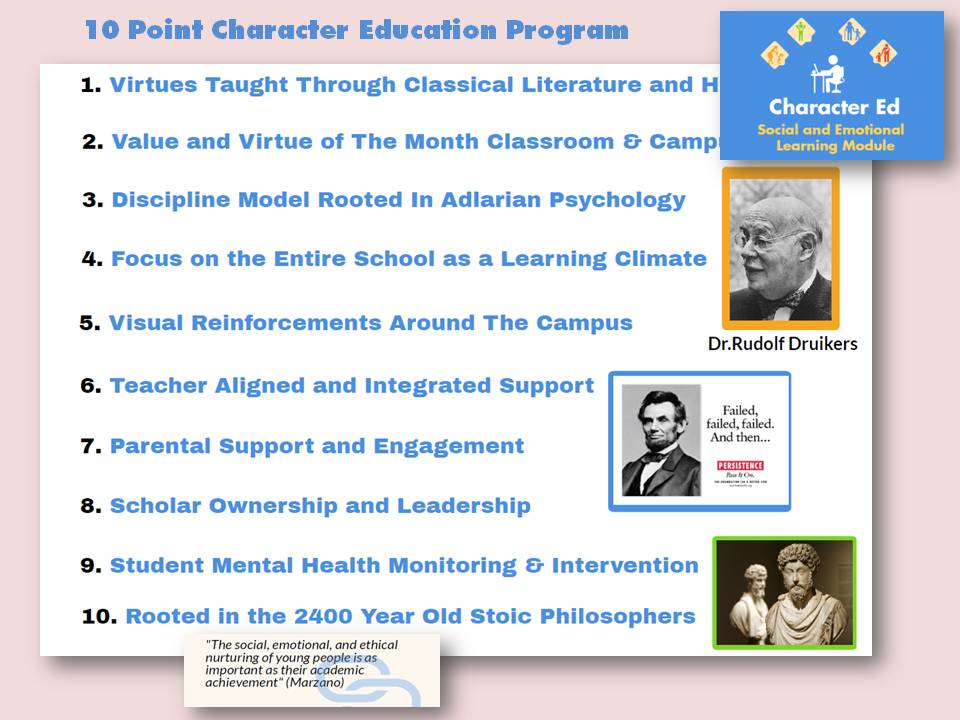
By using the classical works of literature, Medici Classical intentionally expands scholar learning through the power of time-tested moral stories. Societies have used the power of stories to teach the next generation right from wrong for over 5,000 years. The expansion of vocabulary and the ability to internalize these deep rich stories into everyday life is the foundation of the Medici program.
The Medici Classical English framework covers full-length classical novels and source documents for informational text. These are the framework for ELA standards and Values and Virtues education.
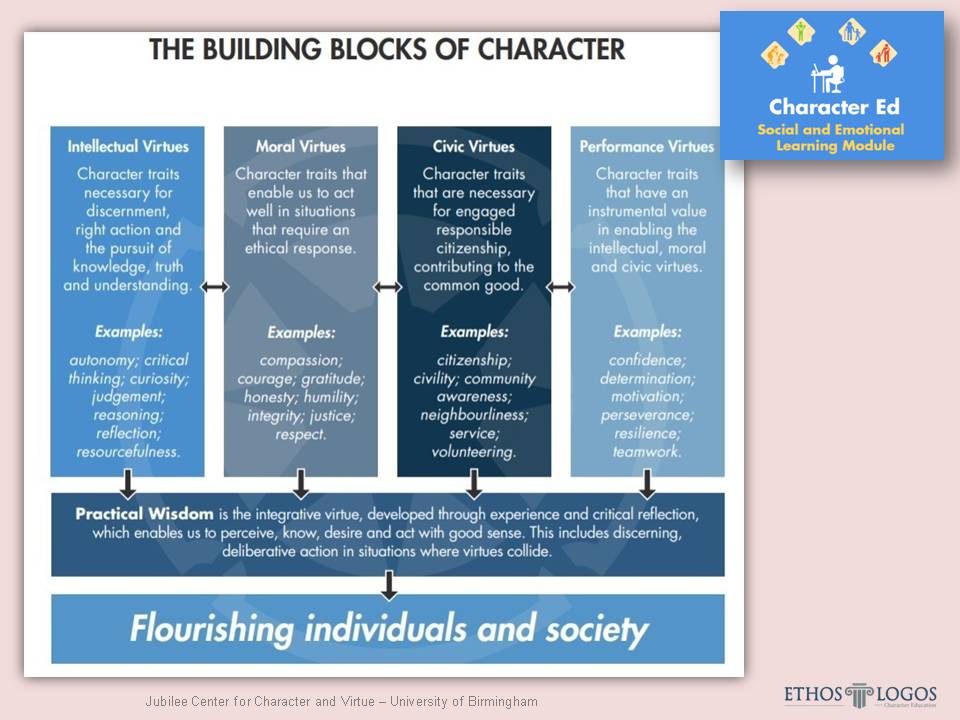
As part of the Medici Classical program, scholars spend intentional time with a featured value/virtue each month which is programmed into the scope and sequence of the curriculum. The in-depth analysis includes school-wide exercises and a classroom discussion on the focus value/virtue. Scholars walk through what each value/virtue means, what the alternatives are, and how their actions affect the scholars around them.
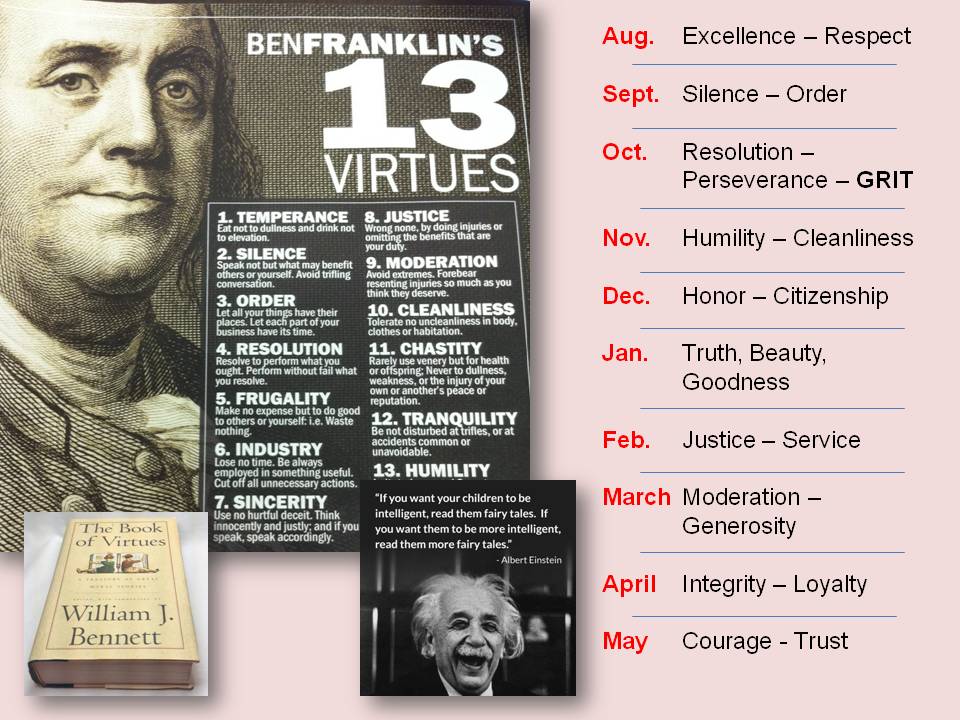
When we speak of schools in America, we immediately understand the role of a teacher preparing students for the big test, the next year of schooling -- but there is so much more to preparing children for the future. To cultivate a student’s character, we must focus on every aspect of a student’s experience in our system.
In our curriculum we are intentional about the way the staff communicates with the students, the dress code, the paint, and posters on the wall, the activities during recess, the way technology is integrated, the school assemblies and the way students transfer orderly through the hallways all reflect on what is important.
All decisions, policies, curricula, and all details of the school’s life should constantly be reviewed through the lens of teachable moments. How you integrate these themes into your homeschool environment is limited only by your creativity. Perhaps when it is school time, your student comes to their work in a uniform. Perhaps you decorate their study area with famous values and virtue quotes that coincide with what we are featuring that month. The idea is to find creative ways to talk about, display, and model a particular virtue so that the concepts stick.
There are three stand-alone modules built into Ethos Logos Digital Curriculum. They are designed to stand alone or for maximum effectiveness, the combination of curriculum, character education lessons, and the step-by-step training and implementation system provides research-backed results for your school.
We have over 80 classes built out that focus on the basics of teaching. From basics like classroom management, student engagement, and planning to more specialized courses like The Power of Narration and Socratic Lessons for higher-level verbal and written skills, the training modules ensure consistency and help develop strong teaching. One of the first things we tell our new teachers is to slow down and have big discussions about characters, times in history, and the moral dilemmas that faced generation after generation. We help teachers/parents make connections.
The major elements of the Ethos Logos Character Program (ELCP) include research-based elements that are important to a successful program. The key elements include:
Language-based curriculum delivered through a strong literature-based curriculum. By using Classical literature as the foundation, the Ethos Logos expands scholar learning through the power of time-tested moral stories. Societies have used the power of stories to teach the next generation right from wrong for over 5,000 years. The expansion of vocabulary and the ability to internalize these deep rich stories into everyday life is the foundation of our curriculum program.
Content and Process - Month-Long Themes on Two Values/Virtues As part of the character education program, scholars spend intentional time with a featured value/virtue each month which is programmed into the scope and sequence of the curriculum. The in-depth analysis includes school-wide exercises and a classroom discussion on the focused value/virtue. Scholars walk through what value/virtue means, what the alternatives are, and how their actions affect the scholars around them.
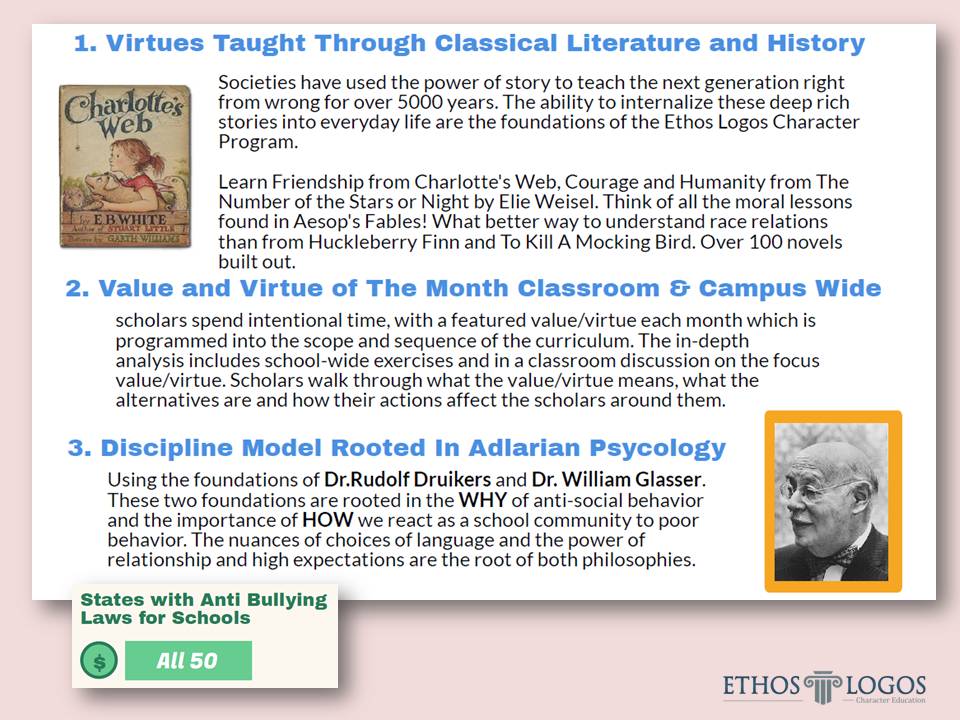
Positive Language and Discipline This method uses the foundations of Dr.Rudolf Druikers and Dr. William Glasser. These two foundations are rooted in the WHY of anti-social behavior and the importance of HOW we react as a school community to poor behavior. The nuances of choices of language and the power of relationships and high expectations are the root of both philosophies.
School Climate Approach – A School-Wide Approach Character education and Bullying prevention do not stop in the classroom. The entire school climate. from orderly transfers in the hallways, holding doors for other scholars or adults, using "please and thank you," lunchroom care, and modeling the appropriate behaviors on the playgrounds are all part of a healthy school climate. Suggestions are provided to campus leaders for school-wide programs that embed the values/virtues of the month.
Visual Reinforcement As part of the roll-out of a Medici/Ethos Logos character ed system, numerous visual reinforcements in the classroom, on the hallway walls, and in the lunchroom and play areas are an important reminder of what the school holds as important. Visuals are custom designed to tie in with famous stories from history which are studied in the classrooms to reinforce character messages. As homeschool parents, we encourage you to look for and display similar visual reinforcements in your student's learning area. A partnership with Values.com also provides more specific options of visual reinforcements for schools with different socio-economic issues or specific issues that need to be addressed.
Teacher/Parent Aligned and Integrated Support Materials The character program has lesson plans, campus-wide programs as standalone modules or for maximum impact embedded in the traditional ELA, History, and Science, and Common Core-aligned lessons. The curriculum-embedded approach allows teachers and scholars to move seamlessly through standards and character instruction. A subset of the support materials, scope, and sequence is a High Degree of Flexibility. No one knows their scholars and what the classroom needs moment by moment better than the teacher in the classroom.
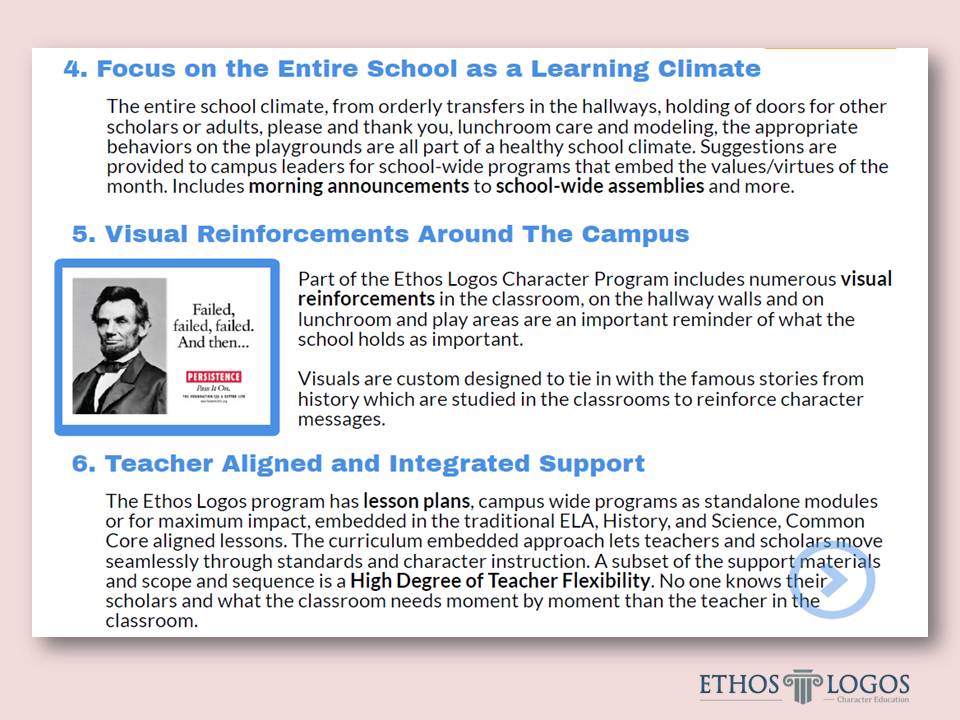
Parental Involvement In School Character Education Parent engagement is paramount for the success of any educational or character-based program. Part of the character program involves parental outreach and focused efforts aimed to engage parents with on-campus activities and service projects. Partnering with families and the community to increase their awareness of the warning signs that students are being targeted or perpetrating bullying, as well as basic bullying prevention and intervention strategies. Research has found reductions in bullying for secondary students may be due to the adult-facilitated approach of many bullying prevention programs (Yeager, Fong, Lee, & Espelage, 2015).
Scholar Ownership Into the Character Program The study of growth mindset and engagement of students in their learning has shown promising results in increasing student outcomes, rising above socio-economic or home life challenges, and creating a sense of belonging on a school campus. Student choice is considered to have similar benefits to those associated with personalized learning. In particular, by empowering students to exercise a degree of autonomous decision-making, student choice makes students active participants in their education, thereby increasing levels of engagement. Notably, researchers highlight the fact that such autonomy is generally associated with greater personal well‐being and satisfaction in educational environments, as well as in terms of academic performance. Studies have found that students with a degree of choice about their learning improved on standardized tests.
Many states are mandating mental health awareness programs for suicide prevention instruction. The root of these initiatives is a plan to monitor the mental health of our students. The character ed program includes the formation of a Culture Review and Monitoring Committee (CRMC) with very specific goals, actionable data to review, and tools to implement all aimed at improving the overall culture at a school. With proper implementation and monitoring, we strive to catch and intervene if a student has a mental health challenge. The CRMC will train staff on best practices in dealing with student mental health issues, the role of Adverse Childhood Events (ACE's) on our student population, and formal staff trainings on the signs of suicide or crisis situations in our students. The CRMC will roll out and monitor the Medici/Ethos Logos programs and develop a culture among the staff of 'see something, say something' when it comes to our students. The CRMC will identify local community service providers and engage these services for our school's students, staff and families.
Foundations Rooted in Stoic Philosophy Stoic model of education—derived from the works of Seneca, Epictetus, and Aurelius focuses on education as knowing yourself and the importance of logic and critical thinking in decision making. In the tradition of Stoic philosophy, education is a preparation for life, and knowledge is integrated into private, local, and global understandings. Roman Stoic thinkers after the fall of the Republic and during the age of Empires adapted Greek doctrine to create a model of the self that served to connect philosophical ideals with traditional societal values. The Roman Stoics engaged in rigorous self-examination that enabled them to integrate philosophy into the practice of living.
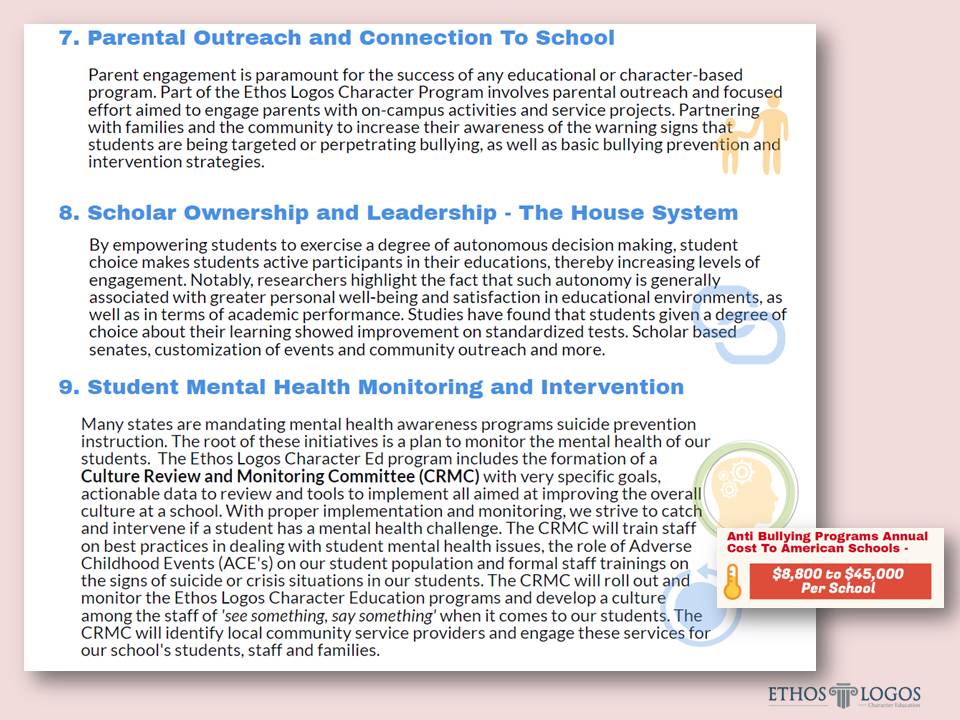
The Ethos Logos Classical English course framework covers full-length classical novels rooted in history and full of characters struggling through life lessons. These stories not only are used to teach grammar, writing and comparative literature but also as a way for our scholars to explore what it means to be aware of others.
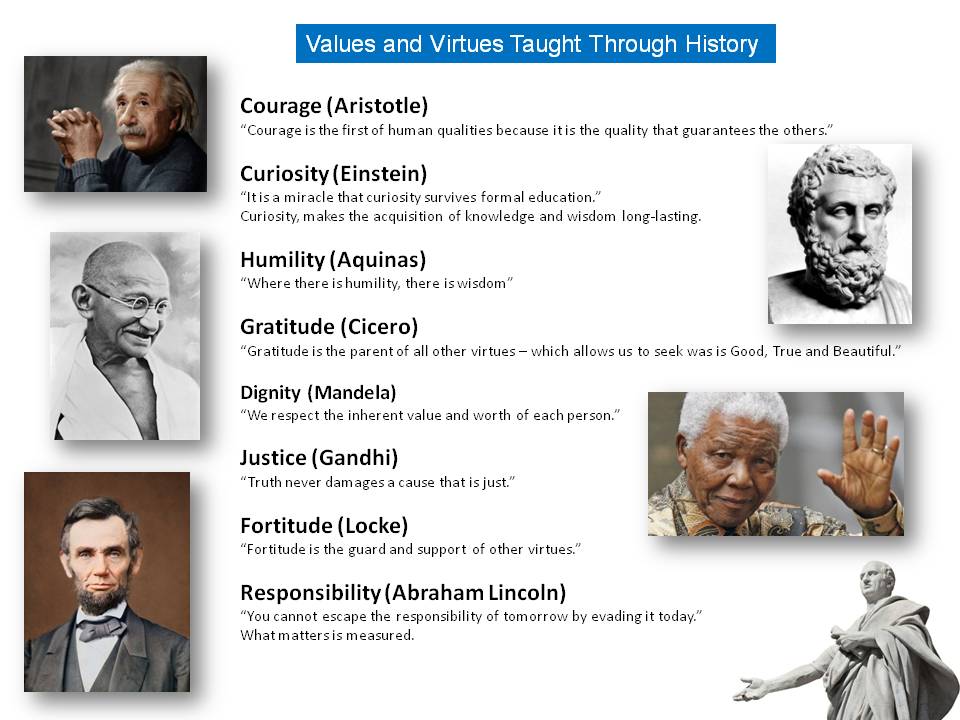
Ethos Logos Classical uses these frameworks to integrate values and virtues discussion into our academics.
For the homeschool family, we recommend the Bill Bennett Book of Virtues as a resource to address particular character-based stories. The short, grade-appropriate stories found in the book, have been curated from societies around the globe as a way to impart wisdom to the next generation. Dr. Bennett breaks the chapters into character attributes such as:

We provide ideas, lesson plans, and discussion prompts based on Dr. Bennett's book as a way to supplement the novels and help you make connections in your own home. The more you can connect character education to what your children are learning academically the more impactful both learning objectives will be.
When we speak of schools in America, we immediately understand the role of a teacher preparing students for the big test, the next year of schooling -- but there is so much more to preparing children for the future. To cultivate a student’s character, it becomes clear that we must focus on every aspect of a student’s experience during their learning process. In our schools, we are intentional about the way the staff communicates with the students, the dress code, the paint, and posters on the wall, the activities during recess, the way technology is integrated, the school assemblies and the way students transfer orderly through the hallways all reflect on what is important. We encourage you to find ways to bring that intention into your homeschooling environment.
Character education is the intentional effort to develop core ethics and value foundations in young people that are important to prosper in American culture.
For character education to be effective, we must work towards buy-in from all the stakeholders. From teachers and administrators to parents and scholars, a comprehensive approach must permeate all aspects of the school. In Classical Education, we believe that character education should be on an equal footing to math and English instruction.